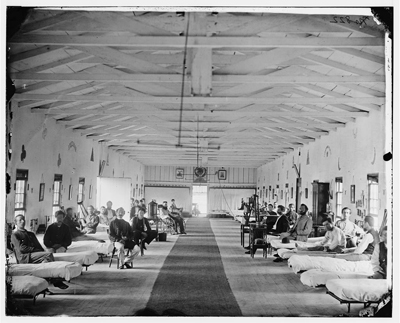by Felicia Wetzig
The doctors and nurses who volunteered during the Civil War may not have been engaging in frontline battles with bayonets, but they witnessed firsthand what the atrocities of fighting did to the human body and spirit. These men and women waged a battle of their own near the frontlines in makeshift operating tents or in hospitals such as Lincoln General and Armory Square in Washington D.C. Like the soldiers, they were stationed hundreds of miles away from their homes and their families. They volunteered to make a difference and support the war effort but often found themselves facing death, disease and hardships.
There were several notable doctors and nurses from Portage County who served under these conditions;
Other Portage County physicians who contributed to the war’s medical efforts were:
Conditions of battlefield medicine
When the Civil War began, knowledge of medicine lagged far behind war technology and battle tactics. Surgeons had little training, often only serving as apprentices instead of receiving formal education. Surgeons did not know how to sterilize equipment; they often went days without cleaning their hands or tools. Frontline conditions also made it impossible to keep anything sanitary with dirt and debris flying everywhere and camps littered with food and waste; the ammunition itself carried dirt and germs into the wounds.
Because of these conditions, disease became the biggest killer of soldiers. According to the Civil War Society’s “Encyclopedia of the War,” the Union army reported that more than 99% of soldiers contracted chronic diarrhea or dysentery, along with outbreaks of measles, chickenpox, whooping cough, malaria, typhoid fever, and pneumonia.
These doctors had no antiseptics, and bandages were usually made on the spot out of whatever material was available. Medicine was also hard to come by and was often crude and unreliable. Luckily, they had access to chloroform, which allowed them to operate without screaming, struggling patients. Despite this advancement, medical practice during the Civil War still caused more harm than good.
J.W. Gaskill, a Portage County soldier of the 104th Ohio Volunteer Infantry recalled the Government statistics for the Union army announced just after the war ended;
Killed and died of wounds, 94,311
Died of disease, 237,374


Portage County Doctors
The Morris Family
The Morris family settled in Franklin Mills (Kent), Ohio in 1838. Among the ten children raised by this family, three would practice medicine in the Civil War.
Dr. Henry Morris was a frontline surgeon through most of the war, but he drowned in the Gulf of Mexico just months before the end of the war.
Dr. John Morris was one of the first volunteers for the Union Army when the war broke out. He immediately enlisted in the 7th Ohio Volunteer Infantry, and by 1862 he made Captain. In 1863, he was honorably discharged and appointed Medical Inspector-General in charge of Lincoln Hospital where he remained until the end of the war. While in Washington, he and his brother Julius Morris, witnessed the assassination of Abraham Lincoln.
Julius Morris was only a teenager at the start of the Civil War. Eager to practice medicine, he trained as a druggist in Maryland, and earned a position in the dispensary of Lincoln Hospital where he was reunited with his brother John. Julius was the only of these brothers to return to Kent after the war. He earned his medical degree at the age of 22 and became a prominent member of Kent’s medical and political community.
Aaron M. Sherman
Aaron M. Sherman was born in Massachusetts and moved to Brimfield, Ohio in 1831. He studied medicine with a doctor in Garrettsville, and at the Medical Department of Western Reserve College of Cleveland long before the war broke out. During the Civil War, he served as an Assistant Surgeon in the Lincoln General Hospital. After the battle of Gettysburg, Sherman wrote a sobering letter describing the severity of the wounded. Sherman was also in the theater on the night Lincoln was assassinated.
Eunice M. Brown
Eunice M. Brown of Windam, Ohio served at a post hospital with her husband James F. Brown where they mainly took care of Confederate prisoners. She often expressed alarm that prisoners received better supplies and rations than Union soldiers. She also overheard the young Confederates whispering about how they were pressed into service, yet refused to leave when they were to be exchanged.
The most compelling of Mrs. Brown’s stories, however, is about a Union soldier, Joseph, who was held in Andersonville prison. The soldier was dying, and wanted only to die in his home with his family. She called in his 80 year-old father, who arrived immediately. Joseph and his father began to cry, but the old man exclaimed, “No, no; my son was a large, fleshy man, six feet two . . . it’s not my Joseph.” The soldier finally convinced his father, and the next morning the two began the tedious journey home. Joseph died the next day in his mother’s arms.
Matilda Morris
Matilda Morris of Randolph, Ohio felt she could do more for the soldiers than stay at home making shirts and bandages, so she decided became a nurse. Her first experience as a war nurse came just after the Second Battle of Bull Run. Since nurses were not trained in medicine, their main purpose was to give the soldiers water and clean them as they arrived from the battlefield.
Like Mrs. Brown, Matilda Morris also saw how the suffering affected entire families. She recalled one man who lost at least two sons to the war, “and so it was all through the war: fathers and mothers, sisters and brothers, –all suffering for the same cause.”
